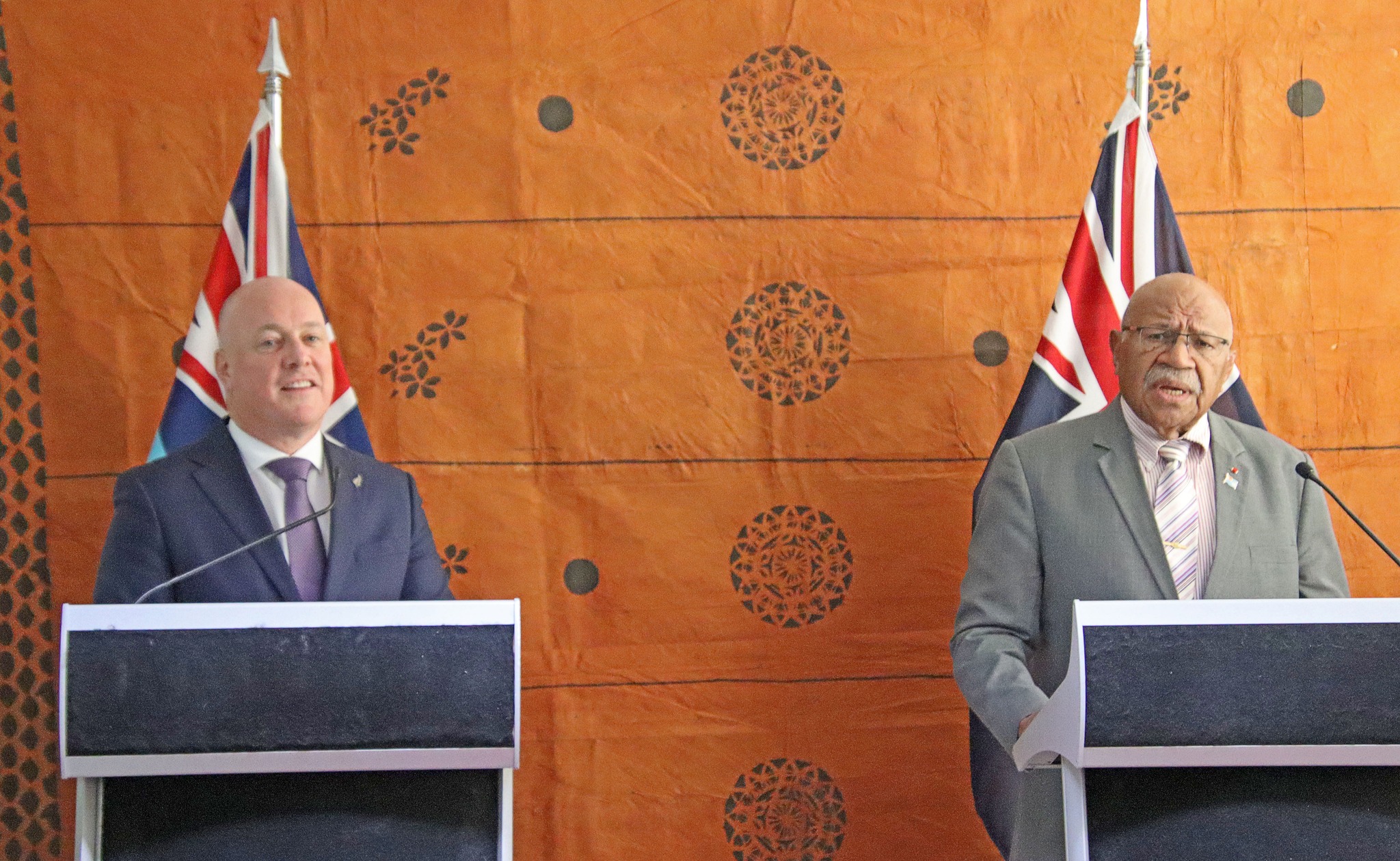Fijian Prime Minister Sitiveni Rabuka is very supportive of New Zealand considering joining the Aukus security pact, saying his nation would likely benefit from it.
His comments, which set him apart from some other Pacific leaders, come as Prime Minister Christopher Luxon stresses no decision has been made as to whether New Zealand joins the pact’s second tier that includes promises to share advanced technology.
Rabuka gave his view during a joint press conference with Luxon in Fiji’s capital of Suva as the Aotearoa leader progressed through the second leg of his first Pacific trip as Prime Minister.
The Aukus agreement spawned between Australia, the United Kingdom and the United States and notably facilitated a deal in which Australia would receive nuclear-powered submarines. Australian political leaders have pointed to China’s growing interest in the Pacific as the reason for the pact.
Luxon has confirmed there would be no change to New Zealand’s longstanding anti-nuclear policy.
He and Foreign Minister Winston Peters have said New Zealand was exploring what the second tier – also known as pillar two – would entail. Peters recently gave a speech outlining how New Zealand would also have to be invited to join the pact.
Asked how Fiji felt about New Zealand exploring Aukus, Rabuka said it was likely Fijians would be beneficiaries of such a pact.
“Any development in that area will also benefit us, so we look at it very, very supportively and objectively.
“We will continue to liaise at bilateral level in our approach to those multinational issues, particularly those that are affecting the region.”
Luxon reiterated the Government’s position that no decision had yet been made regarding New Zealand’s involvement in Aukus.
Rabuka’s comments appeared slightly at odds with an earlier statement he’d made in the press conference when he said he and Luxon had spoken about New Zealand’s role in maintaining the security of the Pacific region.
“I specifically mentioned the role of New Zealand in the prevention of militarisation of the Pacific region and the Pacific nuclear-free zone that they introduced in the 70s … that we continued to support.”
A later statement from Rabuka’s office explained Fiji welcomed the “transparency” of those nations linked to Aukus. It also said Fiji noted the difference between nuclear-powered and nuclear-armed.
Some Pacific Island nations had expressed concern about the security pact with fears it would increase tensions between global superpowers in the region.
Regional security has been a key topic in the Pacific, and Rabuka said Fiji had been very concerned about the outbreak of violence in New Caledonia.
“For us as a regional partner in the Pacific Islands forum with New Caledonia being a Melanesian country, there’s a lot of weight on the Melanesian countries to participate in that … I’m very concerned about our Melanesian kinsmen in New Caledonia.
“We’ve worked with their … population in the past and leadership … and we’d like to have a workable and peaceful resolution.”
He said Fiji was grateful for New Zealand’s assistance with repatriations.
Luxon said New Zealand wanted to see regional solutions to regional challenges.
Luxon’s meeting with Rabuka formed the centrepiece of his first full day in Fiji. After the talks, Luxon announced New Zealand would soon scrap the transit visa that Fijian nationals required to travel through Aotearoa.
He and Rabuka also set a target to grow annual two-way trade between the two nations from its current $1.4 billion (US$868 million) to $2billion (US$1.24 billion) by 2030. That came alongside almost $27 million (US$16.74 million) of spending from New Zealand in Fiji, including a donation to Fiji’s fund that helped relocate communities after natural disasters and an upgrade to airport facilities to help Fiji comply with New Zealand biosecurity requirements.
Luxon, who first visited Niue earlier in the week, began his day with a tour of Tower Insurance’s building in Suva ahead of meeting Fiji President Wiliame Katonivere.
Following the Rabuka engagement, Luxon had a brief meeting with new Pacific Islands Forum secretary general Baron Waqa.
Luxon later said the pair discussed their shared view that countries seeking influence in the Pacific should do so through the forum.
He said they didn’t address specific tensions in the region, nor objectives for the upcoming Forum meeting, given Waqa was only four days into the role.
In the afternoon, Luxon visited Fiji’s police dog centre on which New Zealand spent about $3.3m (US$2 million) over six years to transport dogs from New Zealand to Fiji to assist its police dog division.
He then stopped by the University of the South Pacific(USP) to speak with students from across the Pacific who had received New Zealand funding to study, before a brief chat with New Zealand’s team competing nearby in the Oceania Athletics Championships.
Friday, Luxon’s final day in Fiji before returning to New Zealand, include speaking at a joint business council conference and attending a sevens game between the NZ Defence Force and the Fiji Military Force teams.














